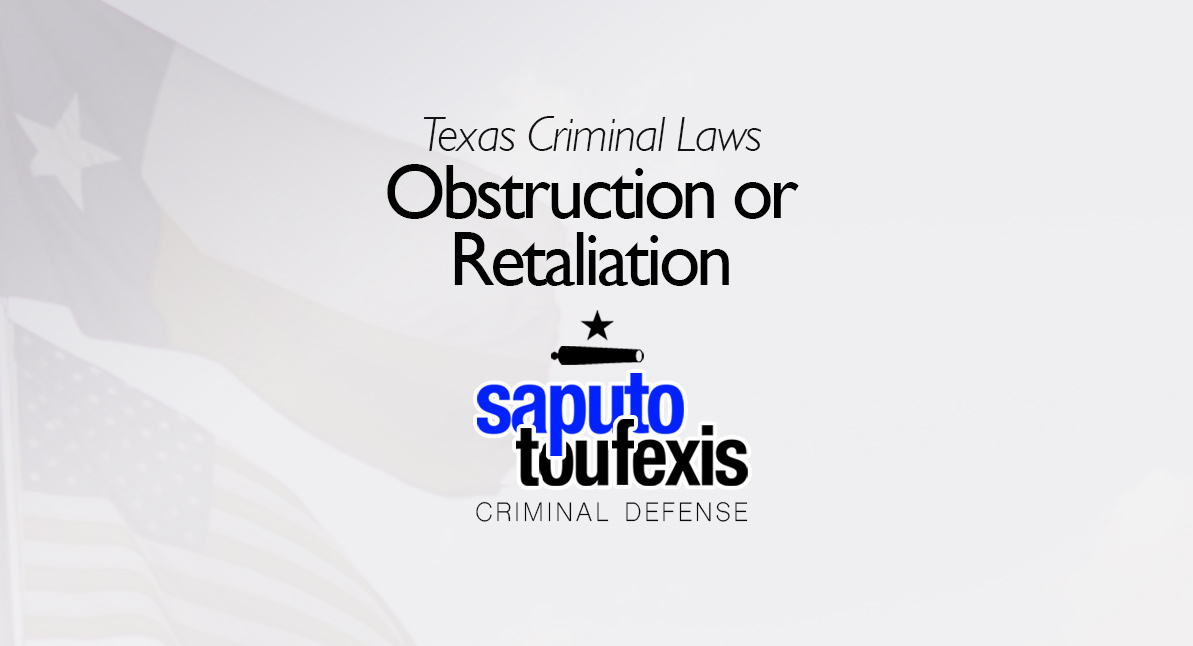The Texas Obstruction or Retaliation law makes it illegal to harm or threaten to harm someone by means of any kind of unlawful act in retaliation for something they did or to prevent something they might do as a public servant (like a judge, a witness, or the police).
FAQs about the
Obstruction or Retaliation law in Texas
- What is the current Texas law about Obstruction or Retaliation?
- How can I be charged with an Obstruction or Retaliation offense in Texas?
- What is the statute of limitation for Obstruction or Retaliation in Texas?
- What is the penalty for a Texas Obstruction or Retaliation offense?
- Can you get probation for Obstruction or Retaliation in Texas?
- What level of crime is Obstruction or Retaliation in Texas?
The law also specifically prohibits retaliation in the form of posting the residence address or telephone number of public servants on the internet.
Have you been charged with Obstruction or Retaliation? Contact us today to discuss legal representation.
or Text or Call (888) 239-9305
The Texas legislature codified this criminal offense in Texas Penal Code Section 36.06. The law was not amended in 2023. However, the law was most recently amended in 2015 when the legislature added subsection (a-1) to the statute, which deals with posting the addresses of public servants on the internet.
The Penal Code classifies the Texas Obstruction or Retaliation law under Title 8 “Offenses Against Public Administration,” Chapter 36 “Bribery And Corrupt Influence.” Learn more about the Texas offense of Obstruction or Retaliation below.
What is the current Texas law about Obstruction or Retaliation?
Texas law currently defines the offense of Obstruction or Retaliation in Penal Code Section §36.06 as follows:[1]
(a) A person commits an offense if the person intentionally or knowingly harms or threatens to harm another by an unlawful act:
(1) in retaliation for or on account of the service or status of another as a:
(A) public servant, witness, prospective witness, or informant; or
(B) person who has reported or who the actor knows intends to report the occurrence of a crime; or
(2) to prevent or delay the service of another as a:
(A) public servant, witness, prospective witness, or informant; or
(B) person who has reported or who the actor knows intends to report the occurrence of a crime.
(a-1) A person commits an offense if the person posts on a publicly accessible website the residence address or telephone number of an individual the actor knows is a public servant or a member of a public servant’s family or household with the intent to cause harm or a threat of harm to the individual or a member of the individual’s family or household in retaliation for or on account of the service or status of the individual as a public servant.
Amendments effective in 2015
The legislature added subsection (a-1) in 2015, effective September 1, 2015.[2]
How can I be charged with an Obstruction or Retaliation offense in Texas?
You can be charged with Obstruction or Retaliation in Texas if the state’s attorneys believe that they can prove each of the elements of 36.06(a)(1), (a)(2) or (a-2), as described in the section above.
What is the statute of limitation for Obstruction or Retaliation in Texas?
Obstruction or Retaliation offenses have a three-year limitations period.[3]
What is the penalty for a Texas Obstruction or Retaliation offense?
A conviction for Obstruction or Retaliation is punished as a felony of the third degree, except that the offense is a felony of the second degree under either one of two conditions: (1) the victim of the offense was harmed or threatened because of the victim’s service or status as a juror; or (2) the actor’s conduct is described by Subsection (a-1) and results in the bodily injury of a public servant or a member of a public servant’s family or household.[4]
Can you get probation for Obstruction or Retaliation in Texas?
The Texas Code of Criminal Procedure allows both judges and juries to grant probation for Obstruction or Retaliation, and judges are also allowed to accept deferred adjudication plea deals.[5]
Note, however, that no matter the offense, neither judges nor juries may recommend community supervision for any suspended sentence of over 10 years.[6] Also, judges may not grant community supervision after a conviction if (1) the defendant used or exhibited a deadly weapon during the commission of the felony or immediate flight thereafter and (2) the defendant used or exhibited the deadly weapon himself or was a party to the offense and knew that a deadly weapon would be used or exhibited.[7]
What level of crime is Obstruction or Retaliation in Texas?
The Penal Code classifies Obstruction or Retaliation as either a second or third degree felony, depending on the circumstances.
Learn more about the penalty range for this offense in the section above.
Legal References:
^1. Texas Penal Code §36.06. This law is current as of 2024.^2. SB 923, 84th Legislature, Section 2^3. See Code of Criminal Procedure 12.01(9)^4. Texas Penal Code §36.06(c)^5. See Chapter 42, Texas Code of Criminal Procedure, Art. 42A.054, Art. 42A.056, Art. 42A.102^6. Art. 42A.053(c), Texas Code of Criminal Procedure^7. Art. 42A.054(b), Texas Code of Criminal Procedure










